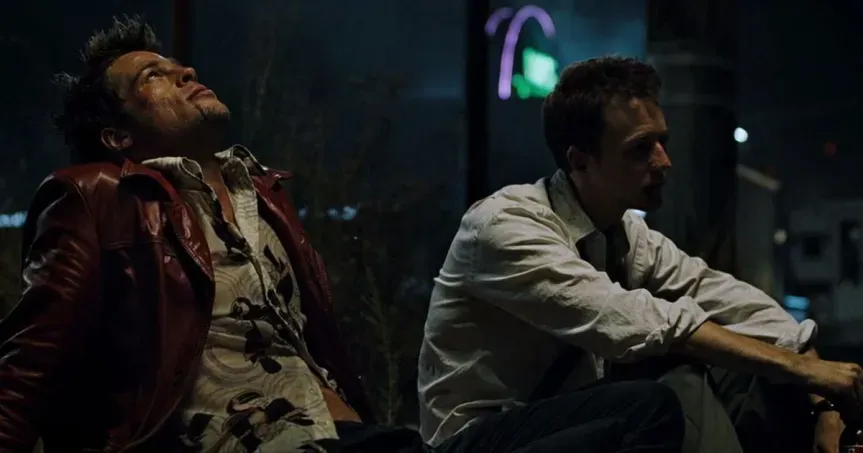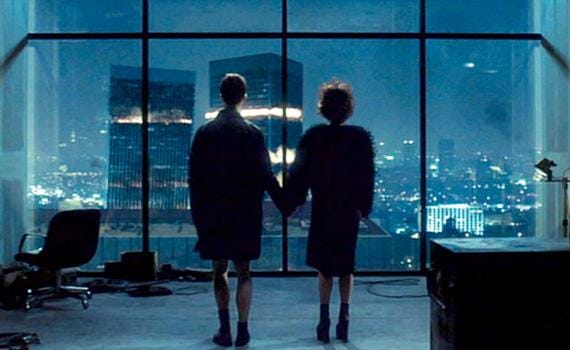SELF-DESTRUCTION SUPERNOVA

"Self improvement is masturbation. Now, self destruction ..." - Tyler Durden
Re-watching 'Fight Club' (1999) last night at the cinema as part of its 25th Anniversary re-release, I was surprised how much I enjoyed the film this time round. Far from being the sweaty gym sock movie of Gen X angst I'd always perceived it as being, I found it smarter, funnier and more eerily prescient than I remembered from my initial impressions watching the film all of a quarter of a century ago.
Fincher's adaptation of Chuck Palahniuk's book is deceptive because it still looks so slick and modern, almost as if it were shot yesterday. The director's penchant for dark tones and coffee stained interiors has always been a noticeable feature of many of his films but none more successfully than here in 'Fight Club' where the Ikea sheen of the late 20th Century appears to go through a colour run more closer approximating the walls of Rigsby's bedsit in 1970s Brit sitcom 'Rising Damp'.
Edward Norton's narrator perfectly expresses the faux white collar angst and empty dread of vacuous materialism of Gen X, those 'middle children of history'. The film also anticipates the Occupy Wall Street movement of 2008 which famously became the first major millennial protest that paved the way for subsequent far left activist movements such as Antifa and Black Lives Matter.
Back in 1999, no-one really knew what they were fighting against other than the apathy of corporate materialism which had appeared to sedate and remove Gen X from identifying any tangible generational narrative to define themselves by. One might even say they were rebels without a cause.
Strangely, the events of 9/11 that violently heralded the arrival of our new century most closely represented the atomic bomb in awakening a drifting generation from its collective slumber into suddenly sensing that everything they'd taken for granted was now in jeopardy. But the video game detachment of reality had already created an 'uncanny valley' for Gen X who mostly preferred to take refuge in their material comforts rather than burn them all to the ground. It would be the millennials that would take the greater delight in destroying things in an attempt to rebuild the world in their 'socially progressive' image.
In so many ways, 'Fight Club' represents the hinge between the 20th and 21st centuries, foreshadowing 9/11, the increasing atomisation of the digital age and the masculinity crisis that is still as relevant as ever in 2024, as proven by the popularity of Jordan 'tidy your room' Peterson, that Commander-in-Chief of all lost boys everywhere.
Brad Pitt's iconic portrayal of Tyler Durden encompasses much of the fizzing madcap energy of the new internet age where rabbit holes, black pills and self-improvement have led to a new form of nihilistic masculinity. But, of course, the internet is nowhere to be found in 'Fight Club' which creates a paradox for such a modern seeming movie, one that has barely aged since its release and yet is of a past century.

Which brings us to the final scene of 'Fight Club', where Norton's narrator and Helena Bonham Carter's Marla Singer hold hands while buildings collapse from detonated explosives on the skyline in front of them, that seems to set the stage for what was to come for the third millennium.
If cinema (at its best) represents a sort of subconscious ID for culture and society at large, then perhaps the anticipation of 9/11 in Fincher's 'Fight Club' proved it had already been dreamed into what would soon become its horrifying reality. The retreating back into our respective safe spaces post 9/11 for most Gen X-ers similar to Norton's narrator at the start of the movie proved that Tyler Durden's underground revolution would quickly become a forgotten dream for a forgotten generation
Durden's revolution, however, would find a new home in the hearts and minds of doomers and Gen Z who have embraced with great relish such rebellious and cynical movie characters as Patrick Bateman, Jordan Belfort and Joaquin Phoenix's Joker and of course, Brad Pitt's post grunge uni-bomber-style anti-hero.